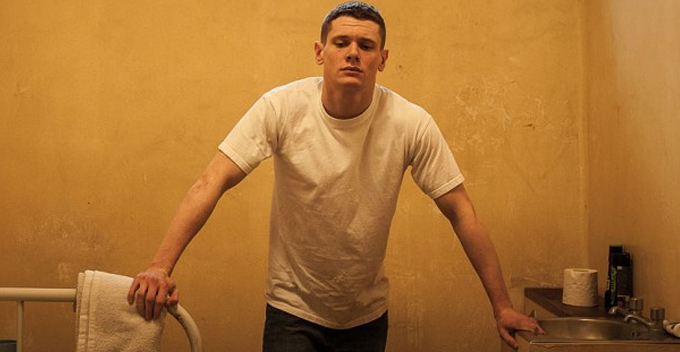
‘In a weird way,’ Michôd states, ‘for me this is a film about love.’
Setting a film in the future can be a risk because intrinsically, people will prepare themselves for a science fiction tale that might involve flying cars, a totalitarian regime, and lots of white clothing. David Michôd’s follow up to Animal Kingdon, The Rover, is set in a future that is more redolent of the past.
When you think of a film like Spike Jonze’s Her for example, the future Los Angeles seems odd but not altogether unrecognisable. Jonze establishes a verisimilitude with the future through fantastic production design and cinematography, and in doing so the future doesn’t feel isolating. In case of The Rover though (which screened in competition at Cannes a few months ago), the future that Michôd presents is anything but connected and thriving like the world of Jonze: it’s nothing like an Orwellian dystopia à la Terry Gilliam’s Brazil or Godard’s Alphaville either, but closer to the atmosphere of Mad Max. It’s the kind of setting where people are forced to lock up their dogs for their own safety and where $300 price tags on items will get you shot.
‘A dark, violent, dirty fable’ as described by the director, the story follows Eric (Guy Pearce) as he hunts down the three men who stole his car. It’s set 10 years after an incorrigible economic collapse, and when Michôd approached producer Liz Watts with the script, ‘The Global Financial Crisis happened and [the story] felt relevant’. While the plot might be minimalistic, the setting in multicultural rural Australia is anything but plain.
Where Her would use a saturated warm colour palette to represent the future, The Rover feels fundamentally planted in earthy browns and greens. Michôd finds digital technology to be ‘amazing’, but the crew made a conscious decision to shoot on 35mm film because it would provide the ‘earthy, organic, milky’ feel that they were aiming for. It does wonders, and undoubtedly the solid cinematography is its crowning triumph.
David Michôd, as his numerous short films have shown, has an eye for gorgeous cinematography, and even in the most violent scenes everything is nice to look at. Also serving as a writer, his direction often makes up for parts where the plot is lacking. Tending to stick to the diegetic soundscape of outback Australia, there’s one particular moment where the American pop song by Keri Hilson, ‘Pretty Girl Rock’, blasts out while Robert Pattinson’s character, in a polysemous meta way, sings along in the car. Not only is this a hilarious moment that hits close to home and juxtaposes well with the desolate landscape, but it proves that Michôd knows the power of music in film well enough to stray from boringly using sad music during the melancholy scenes and upbeat music during the happy ones. The film feels so far from Animal Kingdom, but you can still feel the presence of Michôd’s gaze in everything, promisingly, like a true auteur.
The fundamental test of any director though is always how they handle their actors, and in this case Guy Pearce and Robert Pattinson work well. Michôd initially wasn’t very familiar with Pattinson but was open to the idea of casting him after discovering that he was ‘smart, funny and has a great awkward physical energy’. He wanted to give him ‘the opportunity to show his skillset that no one properly gets to see’ in his other films, and he definitely achieves this feat. Similarly with Guy Pearce, Michôd admired that he ‘was good at giving you that incredible stillness and minimalism.’
Confronted however by a father of an Australian filmmaker in the crowd, Michôd was asked whether he wrote two American characters (the other played by 12 Years a Slave actor Scoot McNairy) into the script for commercial purposes or because it was necessary to the plot. Michôd and Watts eloquently explained that ‘it doesn’t hurt to make an Australian film international’ and that hiring American actors would help secure funding and enable them to ‘make the film that [they] wanted to make’.
One issue in particular that I had for the film was the lack of female characters, because everything felt very male orientated. It’s clear that Michôd knows how to write and direct multidimensional female characters (eg. Jacki Weaver, who earned an Oscar nomination under his direction), so I was excited to see what would come next. He made the comment that there weren’t many characters in the film, and that there was a hoard of women working behind the camera too: this definitely eased my disappointment.
While the film might have this unique setting, stupendous direction and acting, there was something that never quite clicked for me. The reason that the film was set in the future was never really justified and it didn’t feel entirely necessary apart from setting a parallel to the GFC. Perhaps it’s because the lack of lengthy dialogue doesn’t match up with oscillating pace that builds in the first 5 minutes, or that it becomes difficult to emotionally connect with the characters when their motives are unclear.
Speaking to Watts after the screening, I asked what it was like to be working with the ‘young New York’ film distributors A24, because their back catalogue with directors like Harmony Korine and Sofia Coppola didn’t feel aligned with The Rover. She responded by saying that A24 seek films which are ‘distinctive’, and that’s one thing that I can definitely agree on: The Rover, while not totally engaging, was really distinctive. I wanted to avoid using the word ‘visionary’ because that’s how the teaser trailer prematurely (but not unjustifiably) describes director David Michôd, but it actually feels pretty appropriate here.
The Rover mightn’t be the action film some might expect, but one thing that you can bet on when seeing this movie is that it feels pretty darn distinctive. The pacing occasionally feels jumpy, but it works well to distance the audience from the unfriendly environment and helps bring some interesting existential themes into focus during the right moments. The triumph of this film above all is the harsh atmosphere that David Michôd creates, and the dynamic between the two principal characters that exist inside it. Ultimately, that should be enough to hook audiences, proving that Michôd has the workings of a promising auteur.
Grade: B
The Rover opens in Australian cinemas on the 12th of June.









